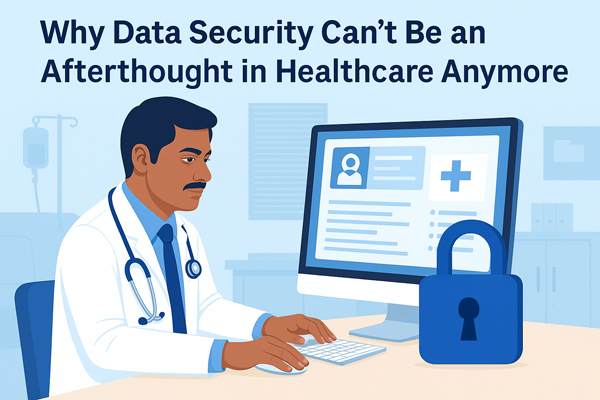Why Data Security Can’t Be an Afterthought in Healthcare Anymore
July 14, 2025In an age where digital healthcare systems are the backbone of patient care, data security has become more critical than ever. With increasing cyber threats and ever-evolving privacy regulations, healthcare organizations can no longer afford to treat data protection as a secondary concern. It is an absolute necessity that demands attention from hospital leadership, IT heads and healthcare professionals alike.
Here, we will explore the importance of data security in healthcare and why it should be at the top of every healthcare executive’s agenda.
Sensitive Data at Risk: A High-Value Target for Cybercriminals
Healthcare data—including patient records, medical histories, lab results and billing information—is a goldmine for cybercriminals. The healthcare sector has become one of the top targets for data breaches because of the value of medical information on the black market. According to studies, healthcare records are worth 10 to 20 times more than credit card data due to their potential for identity theft and fraud.
A single breach can expose patients’ private information, leading to financial losses and reputational damage. This makes implementing robust data security practices non-negotiable.
Regulatory Pressure: Navigating Complex Compliance
With healthcare being one of the most regulated industries, hospitals and healthcare providers must adhere to a complex web of privacy regulations and compliance standards. This includes:
- HIPAA (Health Insurance Portability and Accountability Act) in the United States
- GDPR (General Data Protection Regulation) in Europe
- National Privacy Regulations across countries
These regulations mandate that healthcare organizations protect patient data with the highest standards of security. Non-compliance can lead to hefty fines, legal consequences and the loss of patient trust.
As digital healthcare adoption grows, hospitals must ensure their data management systems are up to the task, offering encryption, secure data storage, and access controls to meet compliance requirements.
Impact of Data Breaches: Beyond Financial Loss
A data breach is not just a financial hit. For healthcare providers, it can also lead to:
- Loss of patient trust: When sensitive medical data is compromised, patients feel vulnerable. This can drive them to seek care elsewhere.
- Legal consequences: The aftermath of a breach can result in lawsuits, regulatory penalties, and costly settlements.
- Operational disruption: A breach can halt operations, affecting everything from patient care to administrative functions.
Thus, data security is an investment that pays off by protecting the integrity of your hospital’s operations and safeguarding your reputation.
The Rise of Advanced Threats: Staying Ahead of Cybercriminals
Cyber threats are becoming increasingly sophisticated. From ransomware attacks that lock critical systems to phishing scams targeting employees, hospitals must stay ahead of these evolving risks.
An advanced Hospital Management System (HMS) equipped with AI-powered cybersecurity measures can detect unusual activity and quickly respond to potential threats, minimizing the risk of data loss.
Proactive defense mechanisms like multi-factor authentication, secure cloud storage, and automated threat detection are essential to ensure that sensitive healthcare data remains safe in today’s environment.
Patient Trust: The Foundation of Quality Care
Patients expect healthcare organizations to safeguard their most sensitive information. Data security directly influences patient satisfaction, and by protecting personal health information, you build long-term relationships based on trust.
In fact, hospitals that prioritize data protection tend to experience:
- Increased patient loyalty
- Improved online reputation
- Better patient engagement
A hospital that offers secure, transparent data handling stands out from the competition, earning the confidence of both patients and regulatory bodies.
The Role of Technology: Adopting a Secure, Scalable Solution
Investing in modern healthcare technologies is no longer optional. A comprehensive Hospital Management System (HMS) should include robust security features that allow hospitals to:
- Securely store and share patient data
- Protect against unauthorized access
- Ensure compliance with local and global regulations
- Provide secure remote access for doctors, patients and staff
By implementing secure software solutions, hospitals can mitigate risks and stay ahead of the curve in safeguarding both operational and patient data.
In Conclusion: Make Data Security a Priority, Not an Afterthought
As the healthcare industry moves towards more digital-first operations, data security will remain a core pillar of healthcare delivery. The consequences of ignoring it are too high. Hospitals and healthcare organizations must prioritize data protection to maintain patient trust, comply with regulations, and safeguard their long-term success.
💡 Ready to Ensure the Security of Your Healthcare Operations?
Data security should never be compromised, especially when it comes to protecting patient health information. Take the first step towards a secure, scalable healthcare solution today.
📩 Contact our team to learn how SoftClinic can provide a secure and compliant digital environment for your healthcare institution.
